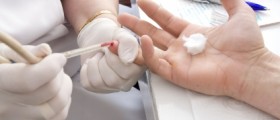
Fortunately, there are things both partners can do to improve sperm motility and to minimize the impact of low sperm motility in getting pregnant. Doctors specializing in reproductive medicine usually do not pay a lot of attention to sperm motility, especially if artificial methods such as in vitro fertilization are planned to help the couple achieve a pregnancy. If the method of impregnation is sexual intercourse, however, sperm motility is an important consideration.
A laboratory technician rates the motility of sperm on a scale of zero to four. A sperm cell that is just "sitting there" on the slide, without moving at all, is rated 0. A sperm cell swimming in circles will be rated 1. A sperm cell that moves across the slide, but not in a straight line, will be rated 2. A sperm cell that moves across the slide in a straight line will be rated 3. And a sperm cell that moves across the slide in a straight line with a powerful speed will be rated 4. Even in healthy men, the largest number of sperm cells will be rated 0. Only about 64 to 65 per cent of sperm show any motion at all. Even if only about 35 per cent of sperm are motile, however, pregnancy is still usually possible.
There are essentially no medical treatments for this condition, but there is a nutritional supplement that was found, in doctor-supervised clinical trials, to help boost sperm motility. This supplement is called L-carnitine. In a clinical trial in the Netherlands, men with this condition, called asthenospermia, took 3,000 mg of L-carnitine a day for three months. At the end of the three months, the volunteers gave another sperm sample. The average number of swimming sperm was just over 37 per cent at the end of the trial, up from an average of 26 per cent. This increase, however, was enough to enable most of the men in the study to become fathers. When sperm motility is an issue, there is also something the female partner can do. Thick cervical mucus impedes the progress of sperm to the uterus.
Thin, "springy" cervical mucus assists the sperm cells' journey to the egg. Many women notice a change in the quality of their cervical mucus toward the healthier clear, white, stretchable and "fertile" form after taking 1,000 to 2,000 mg of evening primrose oil (EPO) every day for about a month. It's important however, only to take this supplement during the first half of the menstrual period. In theory, EPO can induce uterine contractions which, in theory, could interfere with the implantation of the fertilized egg. EPO should also be avoided by women who have seizure disorders.

















Your thoughts on this
Loading...